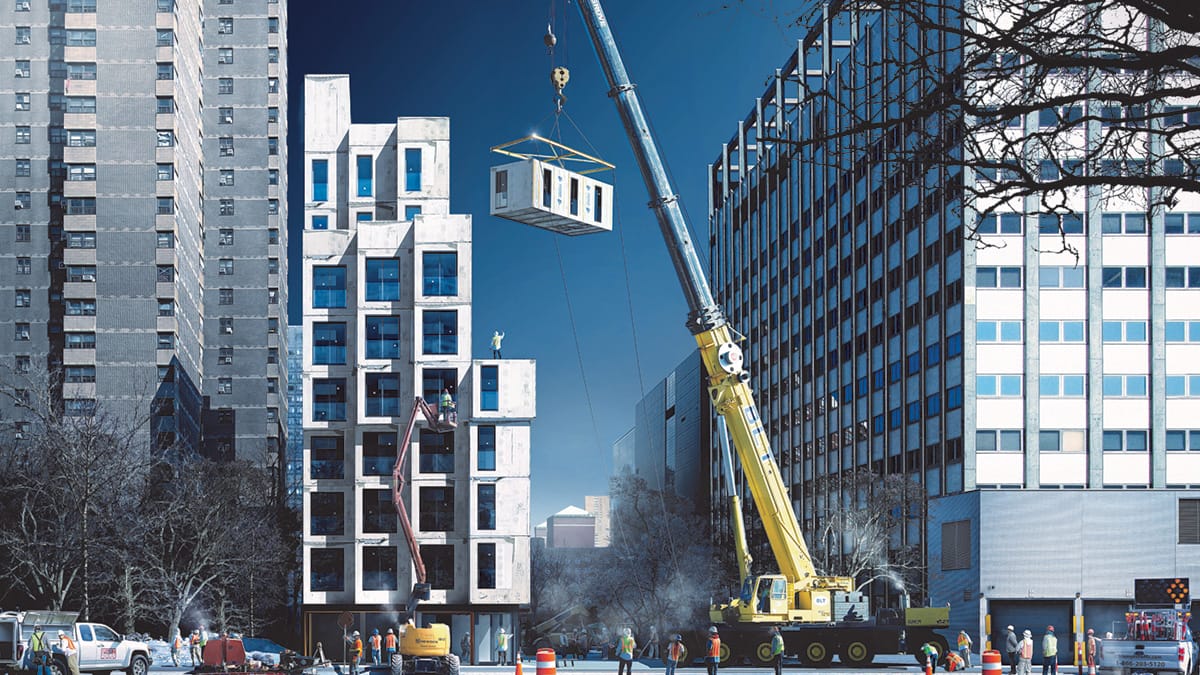Training for MBI Members and Beyond

Heather Packard is the professional and workforce development director for the Modular Building Institute.
By the Numbers, which appeared in the January/February 2024 issue of Modular Advantage, highlighted member needs articulated as part of an intelligence gathering process I initiated in the fall of 2023. This feedback included requests for MBI to create and offer professional development opportunities for member companies and staff, particularly to support new staff on-boarding and training efforts.
Members also expressed a desire for MBI to engage in outreach to academic universities, with a goal towards increasing the supply of better-trained and more well-rounded future designers, architects, engineers, estimators, project managers, and more for our industry.
In response to member feedback, I’m pleased to announce that, in early December, we launched the MBI Learning Center – a destination where stakeholders can experience personal and professional growth and acquire expertise necessary to succeed in our industry – and our first self-paced, online course, Introduction to Commercial Modular Construction.

This first online course introduces learners to an innovative, exciting, and sustainable modern method of construction. It’s designed to help learners gain a comprehensive introduction to the commercial modular construction industry and understand the basics of modular design, manufacturing, and construction. The course offers in-depth explanations of the process, key roles and responsibilities of stakeholders, and the concepts and terminology used in modular building.
Developed with adult learners in mind, the course offers a focused, flexible learning opportunity to upskill efficiently. It is comprised of six modules, broken down into multiple lessons with interactive elements and knowledge checks, and a final learning assessment in multiple choice format.
Successfully completing the Introduction to Commercial Modular Construction online course awards a learner with a certificate of completion and can help demonstrate that they have gained a foundational understanding of the modular construction process, including roles and responsibilities and commonly used terminology. For those already working within or new to the industry, it can help increase understanding on how and where their role fits within the process and provided a shared vocabulary. For students aspiring to work in the industry, it can offer the same while also increasing potential employability.
MBI’s Introduction to Commercial Modular Construction course is open to anyone interested in the modular construction industry. From industry aspirants and newcomers to experienced professionals, this course is an excellent way to become fully versed in the fundamentals of commercial modular construction.
Please visit the MBI Learning Center to view more details about the new course and other available learning assets, including articles, research, and podcasts.
Do You Work for an MBI Member Company?
MBI member companies and staff are eligible to access Introduction to Commercial Modular Construction as a benefit of MBI corporate membership. If you have not yet received your coupon code to discount the pricing, please contact us.
Are You a University Professor or Student Interested in Modular Construction Curriculum?
Please contact Heather Packard (heather@modular.org) to learn more about university access and available resources.
More from Modular Advantage
AI, Faster Sets, and Automation: The Future of Modular is at World of Modular
While the modular building industry has long known that it can be an effective solution to increase affordable housing, the word is slowly spreading to more mainstream audiences. Three presentations at this year’s World of Modular in Las Vegas hope to provide insight and direction for those seeking a real solution to the crisis.
An Insider’s Guide to the 2025 World of Modular
The Modular Building Institute is bringing its global World of Modular (WOM) event back to Las Vegas, and with it comes some of the industry’s best opportunities for networking, business development, and education. Over the course of the conference’s four days, there will be numerous opportunities for attendees to connect, learn, and leverage event resources to get the most out of the conference.
Affordable Housing Now: The Industry’s Best Bring New Solutions to World of Modular
While the modular building industry has long known that it can be an effective solution to increase affordable housing, the word is slowly spreading to more mainstream audiences. Three presentations at this year’s World of Modular in Las Vegas hope to provide insight and direction for those seeking a real solution to the crisis.
Opportunities for Innovation in Modular Offsite Construction
Modular Offsite Construction has already shattered the myth that it only produces uninspired, box-like designs. Architectural innovations in module geometry, configurations, materials, and products make it possible to create visually stunning buildings without sacrificing functionality or efficiency.
Safe Modular Construction with Aerofilm Air Caster Transport
In collaboration with Aerofilm Systems, Heijmans developed innovative skids using air caster technology for moving modules easily and safely. These pallets are equipped with an auto-flow system, making operation extremely simple.
Miles, Modules, and Memes: Building a Modular Network One Flight at a Time
At the end of the day, social media is just another tool for building connections, and like any other tool, needs to be used skillfully to work properly. Use social media thoughtfully, and it will open doors to real opportunities and relationships you didn’t even see coming.
Falcon Structures: Thinking Inside the Box
Some of Falcon’s latest projects include creating container solutions for New York’s Central Park and an East Coast professional baseball team. More and more, Falcon is shipping out container bathrooms and locker rooms to improve traditionally difficult work environments, like those in oil and gas or construction.
UrbanBloc—From Passion to Industry Leader
UrbanBloc specializes in three main categories or markets – what they call “Phase 0” projects, amenities, and urban infill. Clients are often attracted to shipping containers because from a real estate perspective they are considered an asset. Having the flexibility to move and transport these assets allows owners to respond to different circumstances in a fluid manner that they can’t get with standard construction.
The Hospitality Game-Changer
“Hospitality is about more than just providing a service – it’s about delivering an experience,” says Anthony Halsch, CEO of ROXBOX. “And that’s where containers thrive. They allow us to create spaces that are unique, efficient, and sustainable.”
Container Conversions Counts on Simplicity to Provide Critical Solutions
Container Conversions has fabricated and developed thousands of containers for varied projects, including rental refrigeration options, offices, kitchens, temporary workplace housing, and mobile health clinics.










